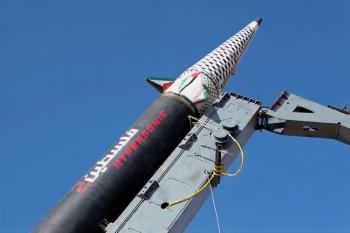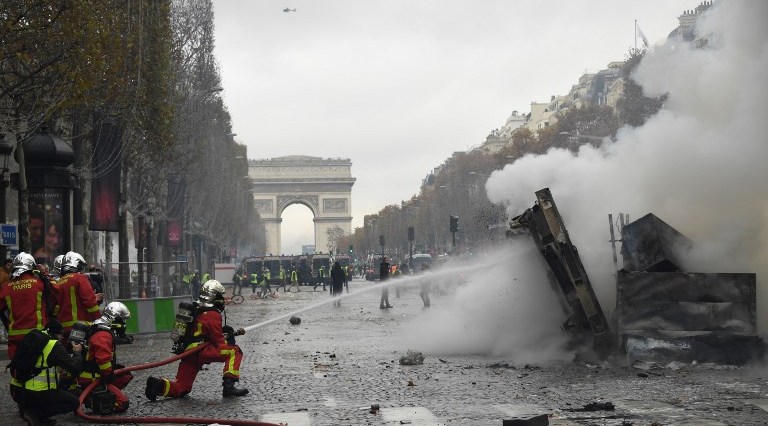Alwaght- Once considered as an inspiring example of success of regional convergence and common market with politicians and researchers prescribing its course for the other parts of the world to move towards development, the European Union is now hit by an array of crises and challenges that very seriously threaten its existence.
While the world expected the protests in France to calm down after five weeks, on Saturday the French cities’ streets once against became setting to demonstrations against the policies of the government of President Emmanuel Macron. Nearly a month ago, the rallies of “yellow vests” broke out in the capital Paris against the administration’s plan to increase the fuel taxes by 20 percent.
It is not only France that is a scene to street anger of the protesters. The neighboring country Belgium is also a scene to massive anti-government rallies, with the Belgians taking to the streets with the yellow vests which increasingly become a symbol of a new European protest move.
These days, Europe is struggling with more than one crisis. The expansion of the yellow vests protests is just one among many factors that are largely shattering hopes of a bright future for the 28-nation bloc. But what are the crises that put the EU unity on a shaky ground?
Internal discontent
The yellow vest movement’s rallies across the EU states is one sign of burgeoning discontent and trust crisis inside the member states. The yellow vest protesters are not ordinary people of the working class or the NGOs. Rather, they are revolting from the lowest social classes, are better to say, from among the most marginalized classes. They complain that their voice has not been heard for years arguing that both the government and the NGOs turn a deaf ear to their calls and that they are fed up with just voting to change the presidents for nothing and that it is time for genuine changes.
The protests exhibit that even the non-governmental activism and syndicates are limited to a special class and the voice of a majority of the citizens remains unheard. The rallies are spreading fast to other European cities like London, Berlin, and Brussels.
The continuation of the demonstrations signals that the liberal democratic system of governance in Europe, despite slogans of preserving the civil rights, is yet to guarantee their provision. In many cases, the priority of interests is given to the minority of the wealthy class. For example, in Belgrade, Serbia, the people are challenging a law that they say is a “slavery law” which they argue mainly observes the interests of the capital owners and employers rather than the employees. The new law allows employers to delay paying the workers for their overtime work for over a year.
So, the current governance system, dubbed social liberal, which is adopted in various levels in the EU states apparently shows a failure in reaching public gratification. The present protests bear witness to this claim.
EU’s delicate unity
Despite four decades of the life of the EU, whose ultimate ideal was realizing a United States style of unity among its members, today the stability and even existence of the bloc are on the line. The exit of Britain, a strong and key member at the EU, certainly increased the vulnerability and weakness of internal cohesion of the member states.
When last month, the French and German leaders raised the idea of founding a European army, they faced negative reactions by other members. The Dutch and Danish foreign ministers argued that with the existence of the NATO, a European force is a politically-motivated and unnecessary plan and that their countries will not throw their weight behind the idea.
Just contrary to the founders’ dreams, the EU unity is not as strong as it was in the beginning. After the Brexit, some right-wingers close to the rightist leader of French opposition Marine Le Pen suggested that Paris takes the same step by holding a referendum to decide whether France wants to stay in the Union. The suggestion aroused the ire of the European leaders. After all, once France moves out of the alliance, the EU will be existing only in name.
The unprecedentedly-fragile unity in Europe is, on the one hand, a product of emergence of rightist and extremely nationalist politics in counties increasingly irked by the dictation of collective policies. The rightism keeps its journey to the top. In Italy, for instance, a right-wing government has assumed the power. In Germany, the stronghold of the Union, the far-right Alternative for Germany party won seats in the German parliament in late September election.
On the other hand, the growth of the rightist politics is triggered by sustentation of political and social crises which are reflected by the recent waves of demonstrations.
International threats
Europe is far from being harmonious with its old partner the US. The new American policy, led by a protectionist government, has largely undermined the EU-US bonds.
The new leadership at the White House, emphasizing unilateralism and “America first” policy, have taken all they can do to prevent power gain of the rival units, including the EU. The White House brazenly supports exits from the EU. An example is the strong backing to the Brexit by the Trump administration.
On the other side, Europe is facing Russia, a tough, long-term rival on its eastern borders which has always felt the European strength a risk to its own national interests. Today's condition is never ideal for the bloc’s rivalry with Russia.
The EU is increasingly losing its maneuvering power on the international stage due to pressures from the US and the constant competition with Russia, with the analysts challenging the suggestion that the Union can define for itself independent interests. This was clear from the Iran nuclear deal. Following Washington pullout of the 2015 agreement, Europeans, who promised to keep the accord alive, moved highly conservative to save the deal. They struggled hard to find a host place for a mechanism for financial transactions to bypass reinstated Washington sanctions on Tehran, something indicating the EU is yet to become an independent actor.



























